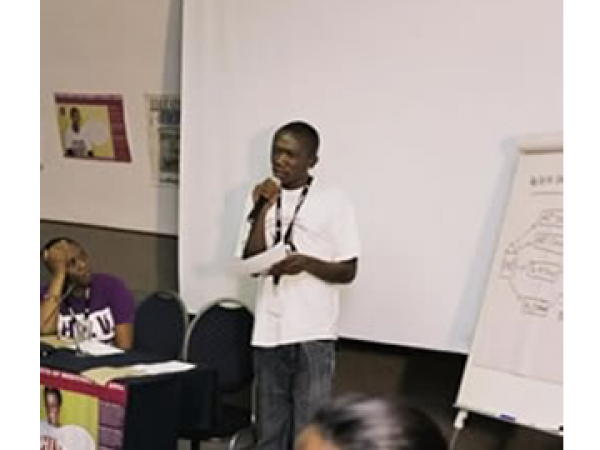Outspoken activist for gay rights arrested in Zambia

Paul Kasonkomona, a Zambian human rights activist with many years’ experience, was arrested in Lusaka on Sunday for publically supporting the rights of Zambia’s sexual minorities. He was arrested shortly after appearing on an independent television channel, Muvi TV, where he spoke in favour of access to health care for sex workers, prisoners, and sexual minorities.
Both homosexuality and sex work are illegal in the country. According to the AFP, police chief Solomon Jere said that he had been arrested for “inciting the public to take part in indecent activities”. He had appeared on the same show a week earlier to discuss recent attempts by four men to register same-sex marriages.
Kasonkomona, who works for Engender Rights Center for Justice, a human rights civil society organisation that promotes the human rights of sexual minorities in Zambia, campaigns for the rights of gay people, sex workers, and people living with HIV/Aids.
On Sunday evening, while the interview was in progress, police arrived at the TV station to arrest Kasonkomona. However, according to the AFP, the station’s management refused the police permission to interrupt the broadcast.
A friend, who asked to remain anonymous, described what happened after the broadcast. “Paul called me immediately after the interview, saying he needed to be picked up because plain clothes police were waiting by the gate of the TV station. When we got there we saw the gate being manned by more than just the security guard on duty. I then called a lawyer friend who also rushed to the station.”
The police allowed both vehicles to enter the building and the two friends managed to speak to Kasonkomona inside the building. “Once convinced we were safe we exited the building and went to the cars,” our source says. They convinced Kasonkomona to climb in the boot of one car, with the other vehicle to serve as a decoy, but the ploy failed. “As we drove out, the gates were closed in front of us and the police ordered both cars to stop and passengers to disembark.” However, they negotiated with police that someone could travel with Paul in the police car while the lawyer followed behind. He was then taken to the Woodlands police station, where the officer in charge booked him, apparently citing section 178 of the penal code for idle and disorderly persons soliciting immoral behaviour.
So far Kasonkomona has retained a lawyer but his friends have been unable to secure his release on bail.
Most of the Zambian people we contacted about the case were reluctant to speak for fear of reprisals. Several said they were afraid of being arrested if they commented, because support for Kasonkomona’s position could be interpreted as promoting the supposedly “unnatural behaviour” of gay men and lesbians, essentially, the same offense for which Kasonkomona has been arrested. One in particular did not want to be interviewed by phone, because he was worried that the calls could be intercepted. 1
One source, who asked to remain anonymous, said that she was particularly worried because she believed that members of the Zambian intelligence service were present or involved at the arrest. As yet we have been unable to confirm this report, because when GroundUp phoned the Woodlands police station in Lusaka to confirm the details of the arrest, the officer on duty said that he could not confirm any information over the phone or via email. Instead he insisted that we come to the police station personally to get details about the arrest (such as the name of the arresting officer, the case number, and the charge). Kasonkomona’s lawyers are also unable to give any information to the media; according to Zambia’s Legal Practitioners Act they would be subject to disciplinary proceedings.
Gregg Gonsalves, one of Kasonkomona’s former colleagues and who now works at the Yale School of Public Health’s Global Health Justice Partnership, described him as “the essence of both solidarity and courage”. He said, “Paul is amazing. He’s now been arrested twice at least for advocating for others. The first time for protesting about health care workers’ salaries and now advocating for LGBT people, even though he is straight.”
In 2007, Human Rights Watch reported on one of these events, when Kasonkomona was detained (along with a colleague from the Treatment Advocacy and Literacy Campaign) for demonstrating with striking healthcare workers.
Kasonkomona’s arrest comes amid new debate about the rights of gay and sex workers rights in Zambia.
In 2010, Zambia was one of many countries that voted to change a United Nations resolution that condemned “Extrajudicial, Summary or Arbitrary Executions”. These countries, mostly Arab and African, wanted to remove protection for gay people from this resolution. Their proposal was defeated.
Another organisation that supports gay rights, Friends of RAINKA, Zambia, described the situation as “a manhunt for LGBTI [Lesbian, gay, bisexual, transgender and intersex] activists” and said, “the LGBTI community in Zambia is existing under extreme fear and pressure and so far, suspected plain clothed police visited homes and offices of some LGBTI organisations in an attempt to destabilise their work.”
According to a report by Global Rights and the International Gay and Lesbian Human Rights Commission, gay people in Zambia suffer unfair discrimination with regards to access to public services like education, employment, and housing, and are subject to arbitrary arrest, detention, and extortion by the police.
-
Recent legislation, the Information Communications Technologies (ICT) Act No. 15 of 2009 and the Statutory Instrument on the Registration of Electronic Communications Apparatus No. 65 of 2011, requires cell phones companies to register all subscribers’ SIM card information with the Zambia Information and Communication Technology Agency. ↩
Support independent journalism
Donate using Payfast


This article is licensed under a Creative Commons Attribution-NoDerivatives 4.0 International License.
